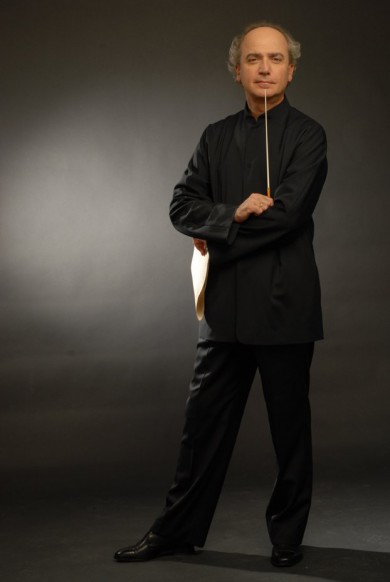MISO goes to the dogs, delightfully, along with Brahms and Rachmaninoff
On Sunday evening, the Miami Symphony Orchestra (MISO) presented its third event of the 2021-22 concert season at the Knight Concert Hall at the Adrianne Arsht Center for the Performing Arts. Conducted by Eduardo Marturet, MISO has made significant strides in becoming a professional orchestra, representative of Miami. Their programming often features newly written works and guest soloists.
The concert opened with the premiere of Karen LeFrak’s Jake the Philharmonic Dog, a charming essay in orchestral color aimed at introducing children to the various instruments.
This narrated composition walks the listener through the day of Richie, a fictional character employed as principal stagehand of the “Philharmonic Orchestra,” and his fascinating musical dog Jake.
LeFrak creates an educational and entertaining sonic landscape for youth using onomatopoeia as the flutes chirped and the timpani and brass roared.
Athina Klioumi, wife of conductor Marturet, narrated the story with pleasant inflections in addition to imitating Jake’s reaction to the timbres of the orchestra by barking and whimpering.
The storyline was visually enhanced by the presence on stage of two guest dogs, Lukas and Sarah, and three children who followed along the reading. While their actual role in the performance was minimal, the two dogs were exceptionally well-behaved and attentive.
Christie Julien was the soloist in Rachmaninoff’s Rhapsody on a Theme of Paganini, a set of 24 variations based on Paganini’s 24th Caprice for solo violin. Paganini’s mischievous theme has been reiterated by numerous composers over the centuries. In the hands of Rachmaninoff, it is transformed to take on a life that reaches far beyond its initial playful nature via rich harmonic expressions and the incorporation of the Dies Irae theme.
While fantastic for the orchestra, the acoustics at Arsht are not so favorable to the piano as a solo instrument. Regardless, in her Miami debut Julien displayed a good array of dynamic variety coupled with solid musicality. There were moments of uncertain synchronization, which led to some nervous playing here and there, but both soloist and orchestra managed to come together for a mostly cohesive performance.
What begins as a harmless playful piano part, plucking away at the outline of Paganini’s tune, soon turns into fragmented devilishly tricky writing. Julien projected the 15th variation Scherzando, with agility and direction giving shape to the shimmering passages in this virtuoso solo. The slower tempo choice for the 12th variation, Tempo di Minuetto, forced the music into a stiff pulse missing its essential dance lilt. Julien showed good control of the technically demanding final four variations particularly in the leaping 24th variation, while the 18th, Andante cantabile, brought forth her lyricism and depth of tone.
The second half featured Brahms’s Symphony No. 2 in D major, Op. 73. After having toiled for nearly two decades to produce his first symphony, Brahms had a significantly breezier time completing his second. Written in the summer of 1877, while at a picturesque lakeside village in Austria, this symphony evokes a bucolic scenery.
A tranquil three-note motif in the strings, woodwinds, and French horns dawns on the Allegro non troppo, as a subdued timpani roll begins to hint at a possible storm brewing. The first movement still holds on to its pastoral nature though, particularly as an endearing fragment from Brahms’s Wiegenlied Op. 49 No. 4 (often referred to simply as Lullaby) makes its way into the strings, later joined by delightful flute descants.
The Adagio non troppo is saturated with achingly beautiful melodies heralded by the cello section, and the Allegretto grazioso, filled with light-hearted rhythmic ebullience. Bright moments for the woodwinds and strings in both movements where good articulations, expansive phrasing, and energetic playing carried them through.
Marturet’s conducting style is anything but conventional. Oscillating between hyper-intense gesturing to simply observing his orchestra, his nonchalant attitude was at times detrimental to cohesion as some cues were not together and the structural arch of the work was compromised.
Nonetheless, he can clearly get a rise out of the orchestra and elevate them into a cohesive ensemble, as specific moments showed. The final Allegro con spirito propelled forward with enthusiasm. Barring some unsettled transitions and pitch inaccuracies, it closed off the evening on a positive note as Brahms’s triumphant finale demands with hefty brass tones and exultant tutti.
MISO continues its 2021-22 season with a chamber music concert on December 28. themiso.org
Posted in Performances
2 Responses to “MISO goes to the dogs, delightfully, along with Brahms and Rachmaninoff”
Leave a Comment
Mon Nov 8, 2021
at 12:22 pm
2 Comments


Posted Nov 09, 2021 at 2:14 pm by R. Escobar
It was a wonderful performance and we enjoyed it very much. Bravo to Maestro Marturet, Ms Athina, Christian Julien and the Miami Symphony Orchestra.
Posted Nov 09, 2021 at 5:36 pm by W. H. Cohen
I attended this performance at the invitation of a friend. I have heard The Cleveland and New World at KCH which, as mentioned, does have outstanding acoustics for an orchestra.
I found the LeFrak work cute. Light entertainment that was fun. This piece would be very good on a Young Person’s concert.
It was difficult to hear the soloist clearly in parts of the Rachmaninoff, unfortunately. What did come through was pleasing, if at times a bit tentative. This was the first time I have seen a solo pianist use her music, requiring an assistant to turn pages. I found this quite distracting. The orchestra performed well overall, with some slips in the horns. It was nice to see the warm reception at the end from the audience. It certainly is thrilling to have live classical music back!
I agree with most of the comments on the Brahms. While there were some executional issues, the end product was very satisfying.
I wish the Miami Symphony much success. Miami is not an easy town for symphony orchestras. MISO deserves as much community support as possible.
W.H. Cohen